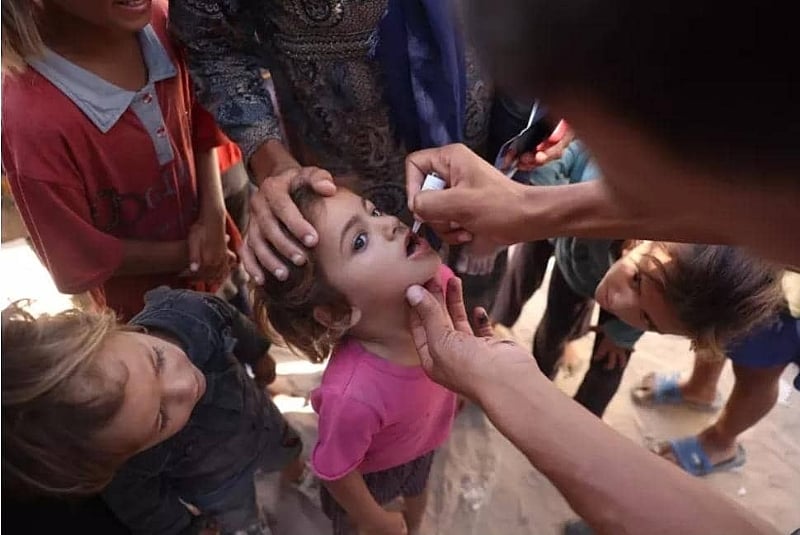In 2023, UNICEF has raised serious concerns regarding the impact of polio on children living in conflict-affected countries as the global community prepares to observe World Polio Day on October 24, 2024. A new analysis from UNICEF reveals that a staggering 85 percent of the 541 children affected by polio this year reside in fragile and conflict-impacted regions. This coincides with a worrying trend, where polio cases in these settings have reportedly more than doubled in the past five years. According to UNICEF, there has been a notable decline in routine childhood immunization rates in these conflict-stricken areas, decreasing from 75 percent to just 70 percent—far short of the 95 percent mark that is necessary for achieving community immunity. These alarming figures illustrate the precarious circumstances in which children in these regions live, where ongoing conflicts, natural disasters, and humanitarian crises severely hamper access to critical healthcare.
UNICEF’s Executive Director, Catherine M. Russell, highlighted the multifaceted dangers that children in conflict zones face, emphasizing that they endure not only physical threats from bombs and bullets but also increased vulnerability to life-threatening diseases like polio, which should have been eradicated in many parts of the world. The ongoing collapse of healthcare systems, alongside the destruction of essential water and sanitation infrastructures, contributes significantly to this resurgence of polio. Russell remarked on the tragic consequences, noting that infected children are often left paralyzed, which inhibits their ability to walk, play, or attend school—key components of childhood and development.
The resurgence of polio poses not only immediate threats to children in these countries but also escalating risks to neighboring nations. The troubling trend of declining childhood immunization rates globally has led to an uptick in polio outbreaks, even affecting countries that had been free of the illness for decades. This situation is most marked in conflict-affected nations, where the UNICEF report indicates that 15 out of 21 such countries, including Afghanistan, the Democratic Republic of Congo, Somalia, South Sudan, and Yemen, are currently grappling with polio cases. This data serves as a stark reminder of the detrimental effects that conflict can have on health systems and public health initiatives.
In response to the resurgence of polio, UNICEF and its partners have ramped up emergency initiatives to combat the rise in outbreaks. A recent vaccination campaign in Gaza successfully reached nearly 600,000 children under ten years old during its first round in mid-September. Although a second round had been implemented in parts of Central and Southern Gaza, the process faced challenges due to renewed mass displacements and bombings in the Northern regions. This campaign marks a significant intervention, especially after polio re-emerged in Gaza for the first time in 25 years. Meanwhile, in Sudan, the national childhood vaccination rate plummeted from 85 percent pre-war to just 53 percent during the conflict, with active conflict zones experiencing a drastic drop to a mere 30 percent coverage. UNICEF and its partners have responded with emergency polio campaigns, reaching approximately 2.9 million children under five through direct house-to-house vaccinations.
UNICEF’s efforts are critical, as the organization delivers over one billion doses of polio vaccines annually, representing the largest share of global vaccine deliveries. The agency has issued a clarion call to governments, partners, and donors, urging them to take decisive actions to protect children from polio, particularly in vulnerable and conflict-plagued regions. Their recommendations include prioritizing polio vaccinations for all children, strengthening immunization systems to ensure delivery of essential vaccines, and safeguarding the humanitarian and healthcare workers who distribute these vital immunizations. Recognizing the complexity of health campaigns in conflict zones, UNICEF also advocates for essential humanitarian pauses to facilitate successful vaccination efforts.
UNICEF’s plea underscores the urgent need for stakeholders to allocate critical resources to initiatives such as the Global Polio Eradication Initiative and Gavi, the Vaccine Alliance, to promptly halt outbreaks and ensure comprehensive vaccination coverage for children. Moreover, UNICEF calls for elevating the eradication of polio on political agendas, emphasizing the need for innovative solutions and coordinated actions to enhance the quality and reach of immunization campaigns. By mobilizing necessary resources and coordination among various entities, there exists a tangible possibility not only to tackle the current outbreaks but also to establish lasting solutions that prioritize children’s health and immunization in challenging contexts. The fight against polio remains arduous, particularly in conflicted environments, yet with focused efforts and collective action, eradication may be feasible.














